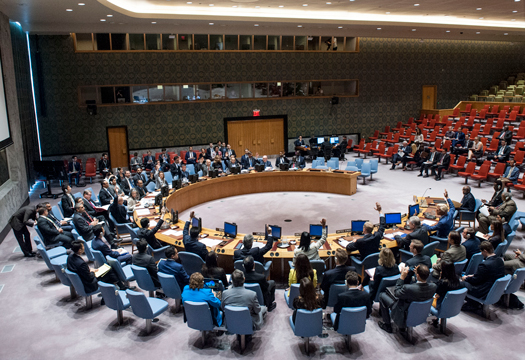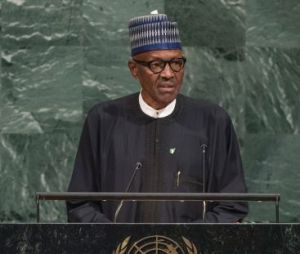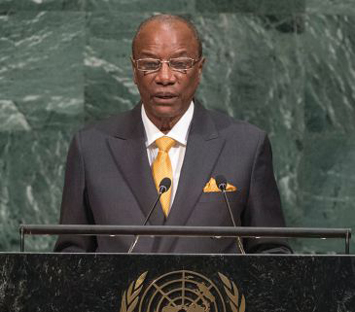African nations seek permanent membership on UN Security Council
By Jehron Muhammad -Contributing Writer- | Last updated: Oct 4, 2017 - 2:03:10 PMWhat's your opinion on this article?

The Security Council unanimously adopts resolution 2372 (2017), extending the authorization of the African Union Mission in Somalia (AMISOM) until May 31, 2018. Photo: UN Photo/Kim Haughton
|
Challenging the United Nations Security Council’s primacy this year during the UN General Assembly (UNGA), was the leader of Africa’s most populous nation and one of its leading economies, Nigerian president Muhammadu Buhari and the president of Guinea, Alpha Condé, who also holds the current presidency of the African Union (AU).

|
“The 21st century will without doubt be a century in which Africans are going to count for more and in a decisive way because there is an ever-greater determination among Africa’s leaders and youth that the hour of renewal has arrived,” Mr. Condé said, while addressing the assembly.
As African leaders over the years have repeatedly done, the AU president called for the enlargement of the 15-member Security Council, the only UN body whose decisions are mandatory and have the power of international law, including permanent seats with veto power.
In 2015 Africa’s first UN Secretary General Kofi Annan (1997-2006) of Ghana said the UN Security Council must take in new permanent members or risk increasing irrelevancy on the international stage.
“I firmly believe that the council should be reformed: it cannot continue as it is. The world has changed and the UN should change and adapt. If we don’t change the council, we risk a situation where the primacy of the council may be challenged by some of the new emerging countries,” he said two years ago.
Echoing Mr. Annan’s sentiments, current Nigerian president Buhari, said for the global body to remain relevant it has to be restructured. “To restructure or not to restructure is no longer the question—the United Nations must be restructured for it to remain relevant in the years to come. How to restructure the United Nations should be our priority number one. Several ideas are out there. All that we need is to get them together and agree on what works for (the) majority of the people of the world,” said Mr. Buhari.

Muhammad Buhari, President of Nigeria, addresses the Assembly’s annual general debate.
|
“As a leader of one of the leading African nations, I want to see a United Nation’s Security Council that is expanded to have one or two African permanent members with veto powers.”
In addition, he said, it needs to happen to give the world “a more balanced outlook on matters of importance to us all.”
Last year, as a non-permanent member of the Security Council, Ethiopia pushed for reforms, including giving Africa two permanent seats on the council.
African leaders’ argument is not a hard one to make. More than three-quarters of the security council’s engagements are on African affairs, but the 54-nation continent has a representation of only three non-permanent members without veto power, reported enca.com last year, in a piece titled: “Ethiopia wants Africa fully represented on UN Security Council.”
The Security Council was created in 1946 by the winners of World War II. It comprises 15 members, five of them—the United States, Great Britain, France, China and Russia—are permanent, while 10 are non-permanent members that serve for two years on a rotational basis. Critics of the council say it represents an international order that no longer exists. The permanent members have historically made binding decisions concerning global issues.
Other critics say the powerful members of this policy-making body, which frequently uses its veto power to enhance its members individual and collective interests, is undemocratic. It brings to question, is this a case of the oppressed joining the oppressors (becoming permanent members), rather than seeking to reform the UN Security Council?
The group’s primary responsibility under the UN charter is for the maintenance of international peace and security. And while other parts of the UN, including the General Assembly, makes recommendations, the Security Council is the only decision making body that the 193 member states are obligated to accept and carry out its decisions.

Alpha Condé, President of the Republic of Guinea, addresses the Assembly’s annual general debate, September 19, United Nations, New York. Photos: UN Photo/Cia Pak
|
Probably the most damning condemnation of the Security Council’s misuse of power came in 2009, from the then leader of Libya, Muammar Gadhafi, who at the time also served as the president of the African Union.
Reading from the Preamble of the UN Charter, Mr. Gadhafi read, “that armed force shall not be used, save in the common interest (of member states).” Mr. Gadhafi, clarifying the wording in the Preamble, while addressing the UN General Assembly, said, “It says that armed force shall only be used in the common interest of all nations, but what has happened since then? Sixty-five wars have broken out since the establishment of the United Nations and the Security Council—65 since their creation, with millions more victims than in the second World War.
Are those wars, and the aggression and force that were used in those 65 wars, in the common interest of us all? No, they were in the interest of one or three or four countries, but not of all nations.”
Mr. Gadhafi continued, noting that the Preamble states, “if armed force is used, it must be a United Nations force—thus, military intervention by the United Nations, with the joint agreement of the United Nations, not one or two or three countries using armed force. The entire United Nations will decide to go to war to maintain international peace and security. Since the establishment of the United Nations in 1945, if there is an act of aggression by one country against another, the entire United Nations should deter and stop that act.”
It’s ironic that the same Security Council that Mr. Gadhafi criticized for using its power to back unjust wars, two years later would set in motion circumstances resulting in the overthrow of his legitimate government and Mr. Gadhafi’s eventual murder.
What has never been satisfactorily answered, as Ronda Hauben questions in her 2011 report, “War on Libya,” published by Global Research, is that as a member state of the UN, “how had the Security Council come to authorize military action against a member nation of the United Nations, in support of an armed insurgency against the government of that nation?”
This is “clearly contrary to the UN provision not to intervene in the internal affairs of a member nation of the UN (Article 2 Section 7).”
Another interesting bit of information is taken from an April 4, 2011 press conference with then president of the Security Council Nestor Osorio, the Columbian Ambassador to the UN.
During the press conference a journalist asked the question, “In the wake of Security Council Resolution 1973 (authorizing military action against Libya), are we to expect a more aggressive and proactive posture on the part of the Security Council in supporting rebel groups?”
His question clearly referenced the fact that with Resolution 1973, that members of the UN Security Council had taken to supporting an armed insurgency group fighting against a member nation (Libya) of the UN. Several journalists said this would be no different than the Security Council supporting other rebel groups like the IRA, the ETA in Spain, the Corsican rebels in France, or the FARC in Columbia.
Two years ago, Maite Nkoana-Mashabane, South Africa’s international relations minister, said during a press briefing that the reform of the UN Security Council is one of the ever-pending issues of world governance.
“We must not reach that point where the organization reaches 70 years (now 72) and there is no change,” Nkoana-Mashabane said. “Africans have a very clear position; we are saying there will be no change without us. The 70 percent of the issues that go to the Security Council are about us, so it cannot continue to be without us.”
Any reform of the Security Council would require the seemingly impossible task of the agreement of all five members of this group of five and at least two-thirds of UN member states. Seventy-two years after its creation, nearly no one claims the Security Council members are either willing to either extend permanent member status, with veto power to others, or that it represents anyone’s interest other than its own individual members.
As former Secretary General Annan said, “In a situation where (member states) are divided, what can we do?”
(Jehron Muhammad is a Final Call contributing writer. Follow him on Twitter @JehronMuhammd)
INSIDE STORIES AND REVIEWS
-
-
About Harriett ... and the Negro Hollywood Road Show
By Rabiah Muhammad, Guest Columnist » Full Story -
Skepticism greets Jay-Z, NFL talk of inspiring change
By Bryan 18X Crawford and Richard B. Muhammad The Final Call Newspaper @TheFinalCall » Full Story -
The painful problem of Black girls and suicide
By Charlene Muhammad -National Correspondent- » Full Story -
Exploitation of Innocence - Report: Perceptions, policies hurting Black girls
By Charlene Muhammad -National Correspondent- » Full Story -
Big Ballin: Big ideas fuel a father’s Big Baller Brand and brash business sense
By Bryan Crawford -Contributing Writer- » Full Story






 Click Here Stay Connected!
Click Here Stay Connected!








